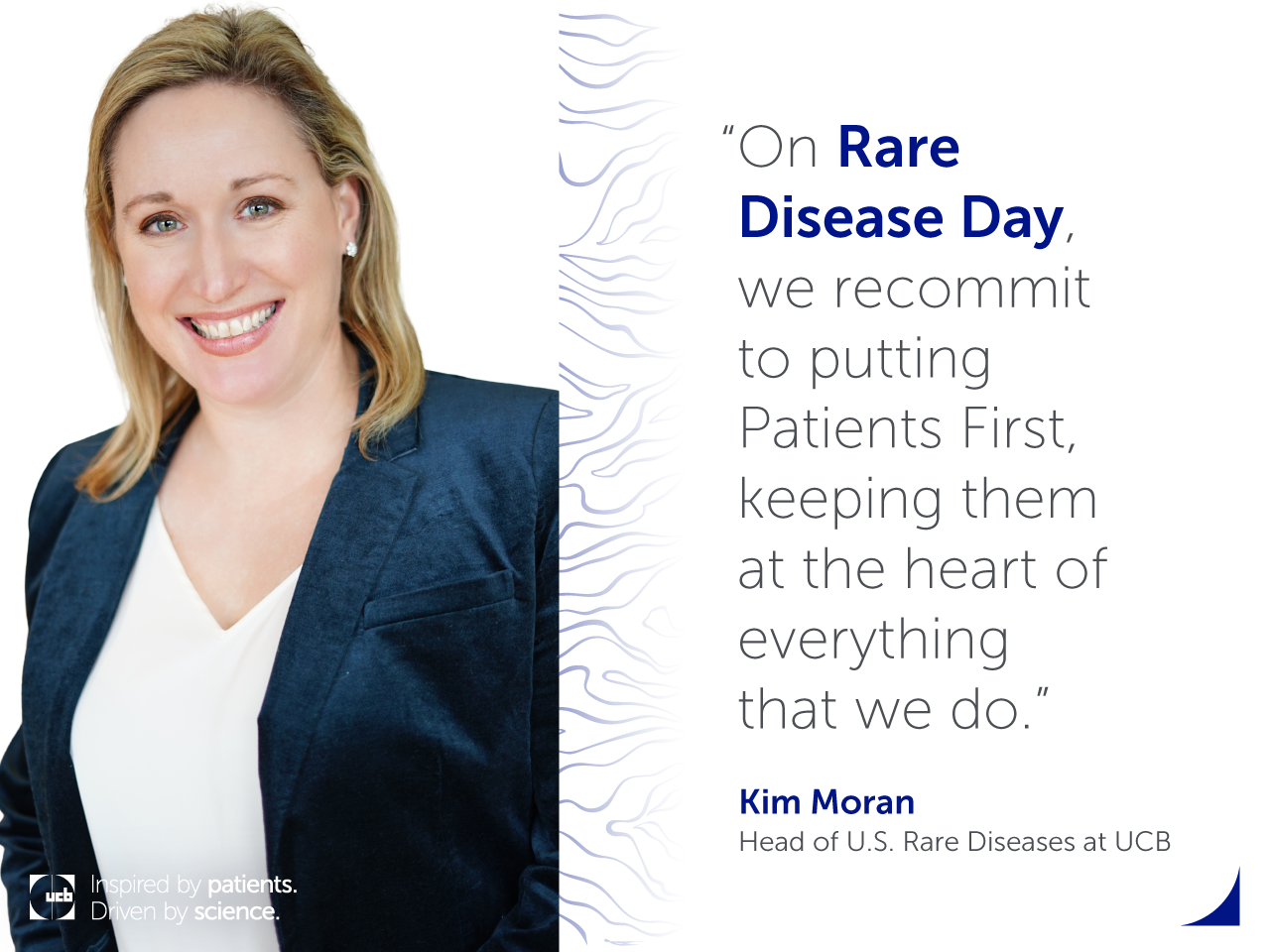
How can we drive momentum in 2023 to deliver transformative solutions for people living with rare conditions? Can we be bolder to deliver for people living with rare disease to live the best life that they can? When up to 85% to 90% of rare diseases are considered serious or life-threatening, we have the responsibility to deliver potential unique solutions for people living with rare conditions.
Rare Disease Day is not only a moment to reflect, but also the time to act – to accelerate access to care and support for the 30 million people living in the U.S. with a rare disease. Partnerships are key levers to that acceleration, so this is also the time to recommit to collective efforts with healthcare professionals, patient organizations, advocacy groups, caregivers, and family members to put Patients First at the heart of everything that we do.
This is especially the case for people living with myasthenia gravis, a rare, chronic, autoimmune, neuromuscular disease associated with muscle weakness. Because the actual symptoms of the disease can vary greatly, each individual experiences the disease in a uniquely personal way, which can cause profound uncertainty. Especially for these patients with differentiated needs, the time is now to accelerate innovation to bring differentiated solutions to help them live their best possible lives.
Our Purpose: Patient-Focused
UCB is inspired by patients. We light up in solidarity with patients by listening to them, to not only learn more about them, but also from them, so that we can fully understand their lived experiences.
We’ve listened and learned from Alexis, living with myasthenia gravis, that he is affected by heat and humidity, which makes preparing meals for his family difficult. We’ve also listened to Lynne, who is the caregiver for her son, Nick, who lives with myasthenia gravis, about the physical and emotional impact of the disease on their family. Indeed, UCB’s journey in rare disease began with the personal experience of a UCB scientist who had a family member living with a rare autoimmune disease. Supported by UCB leadership, he applied his expertise with the hope of improving the care and support experience for those like his loved one.
As a continuation of our heritage in serving the neurology and immunology communities, we’ve prioritized innovation into developing investigational treatments for rare diseases, where current options offer little hope. More than 50% of people living with myasthenia gravis have uncontrolled symptoms, even with treatment.1-5 With such a need, we are motivated to build the body of evidence around the complexities of the disease.
Our Promise: Excellence to Deliver Personalized Patient Experiences
UCB’s approach to innovation informs not just our investigational treatments, but also our wider contributions to support and care.
We are building, from the ground up, an integrated patient services program leveraging patient-level insights and predictive analytics. Foundational to that program are our unique patient-listening sessions that have given us the opportunity to connect more deeply with patients to truly understand their experience on a granular level. Translating those insights to impact, we hope to be able to offer personalized support, education, and resources for each patient. Part of that individualized support will include giving patients access to their own Care Coordinator, who will remain a resource throughout their rare disease journey.
Digital tools also pave the way to individualized care decisions. Data algorithms and Artificial Intelligence help us understand the complexity of each patient to identify the gaps in their needs. This way, UCB can further tailor the care and support for them.
When UCB decided to bring our expertise to the rare disease space, we knew we were going to approach rare differently. On the foundations we’ve already built, and in taking a patient-first, patient-focused strategy, we are poised to address the considerations and challenges of rare disease patients – on Rare Disease Day and every day.
The content of this article is intended for a U.S. audience only.
©2023 UCB, Inc., Smyrna, GA 30080. All rights reserved. US-N-RZ-MG-2300001
References:
- Cutter G, et al. Muscle Nerve. 2019;60(6):707-715.
- Tran C, et al. Eur J Neur l. 2021;28(4):1375-1384.
- Petersson M, et al. Neurology. 2021;97(14):e1382-e1391.
- Grob D, et al. Muscle Nerve. 2008;37(2):141-149.
- Xin H, Harris LA, Aban IB, Cutter G. J Clin Neurol. 2019;15(3):376-385.
Choose a Country
- Global Site – English
- Australia – English
- België – Engels
- Belgique – Anglais
- Brasil – Português
- България – Български
- Canada – English
- Canada – Français
- 中国 – 中文
- Česká Republika – Angličtina
- Danmark – Engelsk
- Deutschland – Deutsch
- France – Français
- España – Español
- Ελλάδα – Ελληνικά
- India – English
- Ireland – English
- Italia – Inglese
- 日本 – 日本語
- Казахстан – ағылшын тілі
- 한국 – 한국어
- Luxembourg – Anglais
- Luxemburg – Engels
- Magyarország – Angol
- México & Latinoamérica – Español
- Nederland – Engels
- New Zeeland – English
- Norge – Engelsk
- Österreich – Deutsch
- Polska – Polski
- Portugal – Inglês
- România – Engleză
- Россия – Русский
- Slovensko – Anglický
- Suomi – Englanti
- Sverige – Engelska
- Schweiz – Deutsch
- Suisse – Français
- Türkiye – Türkçe
- Україна – Англійська
- United Kingdom – English
- U.S.A. – English